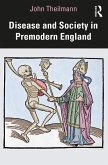Dieser Download kann aus rechtlichen Gründen nur mit Rechnungsadresse in A, B, BG, CY, CZ, D, DK, EW, E, FIN, F, GR, HR, H, IRL, I, LT, L, LR, M, NL, PL, P, R, S, SLO, SK ausgeliefert werden.
Michael Rembis, University at Buffalo, The State University of New York, USA
"Professor Pietkäinen has given us a comprehensive and highly analytic history of how cultures have understood madness. He questions the medical model of madness and shows how interpretations of mental illness have changed throughout history and across cultures. This book will greatly please anyone who teaches the history of psychiatry, but the book also will be fascinating for anyone interested in understanding human behavior."
Lisa Raskin, Amherst College, USA
"This candid, ambitious and compelling study offers us a highly readable, provocative, synthetisising account of madness' long and problematic history. Taking us from the Medieaval landscape of folly and demonic possession, through early modern and Enlightenment views and treatments of madness, to the birth of the asylum and the modern ages of psychopharmacology, anti-psychiatry and social care, this is as much a history of problematics in how madness was and is managed as of advances in how it was and is perceived. Seeking to situate rather than to anatomoise or pathographise madness, Pietikäinen phenomenologically elucidates how madness manifests itself or 'makes itself visible' in different contextual and temporal settings. He tells us tales less of progress than of unfulfilled hopes, less of mental illness and evolving diagnostic clarity than of the problems in constructions of being in terms of dependence and vulnerability, less of the commonalities in madness' manifesting than the manifold varieties of mental distress, wellness and being."
Jonathan Andrews, Newcastle University, UK









